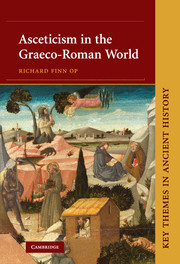Book contents
4 - Origen and his ascetic legacy
Published online by Cambridge University Press: 22 January 2010
Summary
We have seen that by the early third century the periodic fasting of the many and the sexual abstention of a smaller number were significant features of many Christian churches. Fasting was commonly seen as integral to prayer. The involuntary celibacy of many widows, by being taken together with the permanent abstinence vowed by some consecrated virgins, was given by writers a symbolic role in manifesting the holiness of the Church. Absent was any widespread belief that fasting and sexual abstinence entered into a personal struggle for holiness. Christian asceticism had not yet been adapted into a popular narrative that related the difficult making of a saint in conflict with his or her own failings.We now turn to this development, and to the single most important author of this narrative: Origen. This learned exegete is notorious for supposedly castrating himself as a youth inspired by Matthew 19:12. The story may be a later slur given undue credence by Eusebius. What matters here is Origen's influence on the changing understanding and growth of Christian asceticism.
THE MIDDAY SUN AT MAMRE – ORIGEN'S ASCETIC VISION
At Mamre, Origen observed in a homily, God had appeared to Abraham in the full glare of the midday sun, and had sat down with his two angels to share the banquet offered them by the patriarch. But God had not accompanied his two angels to Sodom, where in the failing light of dusk Lot gave them a simpler meal of bread.
- Type
- Chapter
- Information
- Asceticism in the Graeco-Roman World , pp. 100 - 130Publisher: Cambridge University PressPrint publication year: 2009



